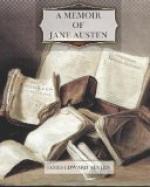Again: ’When staying at Chawton, with two of her other nieces, we often had amusements in which my aunt was very helpful. She was the one to whom we always looked for help. She would furnish us with what we wanted from her wardrobe; and she would be the entertaining visitor in our make-believe house. She amused us in various ways. Once, I remember, in giving a conversation as between myself and my two cousins, supposing we were all grown up, the day after a ball.’
Very similar is the testimony of another niece:—’Aunt Jane was the general favourite with children; her ways with them being so playful, and her long circumstantial stories so delightful. These were continued from time to time, and were begged for on all possible and impossible occasions; woven, as she proceeded, out of nothing but her own happy talent for invention. Ah! if but one of them could be recovered! And again, as I grew older, when the original seventeen years between our ages seemed to shrink to seven, or to nothing, it comes back to me now how strangely I missed her. It had become so much a habit with me to put by things in my mind with a reference to her, and to say to myself, I shall keep this for aunt Jane.’
A nephew of hers used to observe that his visits to Chawton, after the death of his aunt Jane, were always a disappointment to him. From old associations he could not help expecting to be particularly happy in that house; and never till he got there could he realise to himself how all its peculiar charm was gone. It was not only that the chief light in the house was quenched, but that the loss of it had cast a shade over the spirits of the survivors. Enough has been said to show her love for children, and her wonderful power of entertaining them; but her friends of all ages felt her enlivening influence. Her unusually quick sense of the ridiculous led her to play with all the common-places of everyday life, whether as regarded persons or things; but she never played with its serious duties or responsibilities, nor did she ever turn individuals into ridicule. With all her neighbours in the village she vas on friendly, though not on intimate, terms. She took a kindly interest in all their proceedings, and liked to hear about them. They often served for her amusement; but it was her own nonsense that gave zest to the gossip. She was as far as possible from being censorious or satirical. She never abused them or quizzed them—that was the word of the day; an ugly word, now obsolete; and the ugly practice which it expressed is much less prevalent now than it was then. The laugh which she occasionally raised was by imagining for her neighbours, as she was equally ready to imagine for her friends or herself, impossible contingencies, or by relating in prose or verse some trifling anecdote coloured to her own fancy, or in writing a fictitious history of what they were supposed to have said or done, which could deceive nobody.




